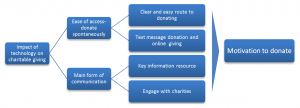Arcus Fundraising Donor Clusters
- Sample analysis: “Technology mavens”
- Impact of technology on giving by the next generation of Canadian adults
 An analysis by Arcus Analytics indicates that the next generation of Canadian adults is driving the future of charitable donations through an increasing emphasis on technology. Arcus looked at the role technology plays in charitable giving, particularly among younger generations. Our analysis found that one in three young people say technology has had an impact on the amount of money they have donated to charity over the past five years.
An analysis by Arcus Analytics indicates that the next generation of Canadian adults is driving the future of charitable donations through an increasing emphasis on technology. Arcus looked at the role technology plays in charitable giving, particularly among younger generations. Our analysis found that one in three young people say technology has had an impact on the amount of money they have donated to charity over the past five years.
Main form of communication: We are seeing a generation of people who epitomize the changing consumer, growing up with mobile phones and the internet as their main form of communication and their key information resource. For these changing consumers technology clearly plays a central role in all aspects of the lives, including the way in which they engage with charities and the third sector – largely because it provides an instant and direct route to donations.

Ease of access: The importance of ease of access was highlighted by the study’s findings: 59 per cent of respondents to the study said a clear and easy route to donating was an important factor in determining which charity they donate to. This is a higher figure than the number who quoted the importance of loyalty in influencing donation decisions.
Donations online: Twenty per cent of respondents aged 18-24 donate more money as a result of technology, while 54 per cent of this age group said the introduction of services like text message donation and online giving has encouraged them to donate spontaneously. Almost one in three respondents (30 per cent) say they now donate to charities they would not previously have considered.
Text donations: Technology is having such a significant impact on donation trends for young people that a third of respondents admit that the absence of the option to donate online or via text donations means they will give their money to another charity. A further 30 per cent also said that failure to supply a way of digital donation would mean they would forget about the cause and not donate at all.
Social media influences: Further findings from Arcus Analytics highlight the way in which social media influences engagement with charities. More than a third (35 per cent) of young people said they prefer to use Facebook and Twitter to follow and interact with the causes they care about, demonstrating the awareness and fundraising opportunities that these platforms offer charities.
Key insights:
- A generation of people are growing up with mobile phones and the internet as their main form of communication and their key information resource.
- Charities that offer a clear and easy route to donating are more likely to see increases in donors and donations.
- They prefer to use Facebook and Twitter to follow and interact with the causes they care about.
Application of key findings
Success story from the Alzheimer’s Society in the UK: The Alzheimer’s Society in the UK, in association with Tesco’s, launched a ‘Scary’ Campaign for Halloween. Supporters were asked to text the Keyword Scary to 70080 to receive a trick or treat and make a £1.50 donation. The response message was configured to give the supporters 10 random ‘trick or treat’ response messages ranging from jokes to the recipe for Pumpkin soup.
The Alzheimer’s Society had used text donate before, but they had not used it in such an innovative way. The campaign was themed around Halloween and used a special platform which let them send randomized bounce-back messages to their supporters featuring a trick or a treat.
This type of text donate campaign was a first for Alzheimer’s Society. Their expectation is that it would be attractive to those wanting to donate to a charity, but don’t have the time to spare to organise a fundraising activity. It’s was a fun and easy way to celebrate Halloween while raising vital funds to help fight dementia. The campaign was a fresh way to raise money for the Alzheimer’s Society.
If you are interested in retaining our services, please contact our managing partner, Merril Mascarenhas, by phone at +1 (416) 710-2727 or Email.
“Needless to say, there are many firms that provide research and strategy consulting services, but few can deliver the value demonstrated in performing the scope of analysis, strategies, product evaluations and practical recommendations. Your commitment and ease of doing business with your firm ensured that we had a sound basis to address our most challenging business decisions.” – Mr. Peter Flattery, CEO, Healthcare Insurance Reciprocal of Canada
